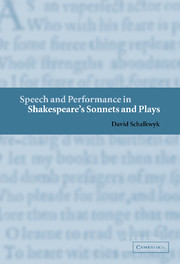Book contents
- Frontmatter
- Contents
- Acknowledgements
- Introduction: the sonnets
- 1 Performatives: the sonnets, Antony and Cleopatra and As You Like It
- 2 Embodiment: the sonnets, Love's Labour's Lost, Romeo and Juliet and Twelfth Night
- 3 Interiority: the sonnets, Hamlet and King Lear
- 4 Names: the sonnets, Romeo and Juliet, Troilus and Cressida and Othello
- 5 Transformations: the sonnets and All's Well that Ends Well
- Conclusion
- Bibliography
- Index
Conclusion
Published online by Cambridge University Press: 22 September 2009
- Frontmatter
- Contents
- Acknowledgements
- Introduction: the sonnets
- 1 Performatives: the sonnets, Antony and Cleopatra and As You Like It
- 2 Embodiment: the sonnets, Love's Labour's Lost, Romeo and Juliet and Twelfth Night
- 3 Interiority: the sonnets, Hamlet and King Lear
- 4 Names: the sonnets, Romeo and Juliet, Troilus and Cressida and Othello
- 5 Transformations: the sonnets and All's Well that Ends Well
- Conclusion
- Bibliography
- Index
Summary
In this systematic reading of Shakespeare's sonnets in relation to his plays I have set out from the assumption that Shakespeare's involvement with the theatre informs his writing of sonnets in decisive ways. Such a reading has made possible the argument that the language of the sonnets is composed of a variety of essentially performative, rather than descriptive, speech acts. The player-poet of Shakespeare's sonnets engages in a discourse of self-authorisation by mobilising, not merely the perlocutionary (or rhetorical) force of language (this has been long recognised), but also its illocutionary force. In the latter, situations may be transformed in the saying of something, personal and social relations forged and reflected in ways not registered in formal rhetorical handbooks. The elaborate, embodied contexts of address and interaction in Shakespeare's theatrical art enable us to imagine situations of personal interaction and social pressure that their purely textual existence has tended to obscure.
Linking the contextualist linguistic philosophies of Ludwig Wittgenstein and John Austin to the sonnets and plays – especially the sonnets in the plays – has enabled me to focus more precisely on recent materialist, historicist and feminist concerns with the ways in which Shakespeare's sonnets worked in their historical and social world. The agency embodied in the sonnets is circumscribed by inequalities of social class, informed by the exigencies of personal desire and made possible by received literary conventions and socially given language games.
Information
- Type
- Chapter
- Information
- Speech and Performance in Shakespeare's Sonnets and Plays , pp. 238 - 242Publisher: Cambridge University PressPrint publication year: 2002
